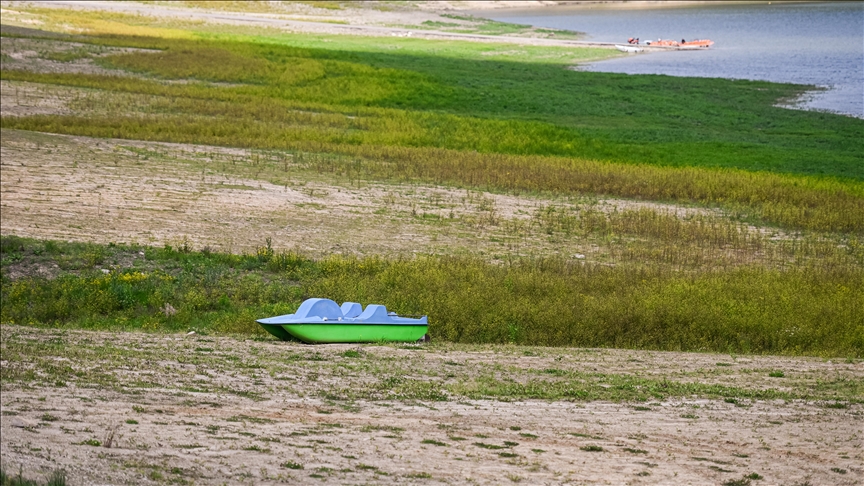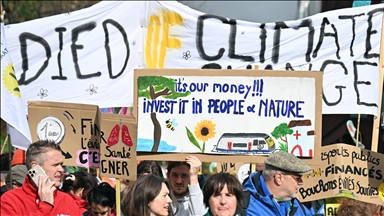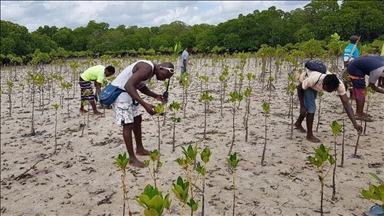Climate change on trial: Can lawsuits against corporations expedite justice?
Experts say German court’s ruling that major corporate polluters can be held responsible for emissions has opened a new era for climate litigation
 A view of Klimkowka water reservoir with extreme low water levels due to the ongoing drought in the region in Klimkowka, Poland on June 09, 2025.
A view of Klimkowka water reservoir with extreme low water levels due to the ongoing drought in the region in Klimkowka, Poland on June 09, 2025.
- The court affirmed that major emitters ‘can, in principle, be held responsible for climate-related harms,’ says Joy Reyes of LSE’s Grantham Research Institute on Climate Change and the Environment,
- Corporations must now seriously consider how to address climate-related harms and develop mechanisms for appropriate compensation, says Miriam Saage-Maass, legal director at the European Center for Constitutional and Human Rights
ISTANBUL
A landmark lawsuit by a Peruvian farmer against a German energy giant may have been dismissed, but its ruling – that major corporate polluters can be held responsible for their emissions – has raised hopes for the global fight for climate justice.
A decade ago, Saul Luciano Lliuya, a Peruvian farmer from the Andes, took legal action against RWE, one of Europe’s largest energy companies. Lliuya argued that the company’s global greenhouse gas emissions had accelerated the melting of glaciers in the Andes, significantly increasing flood risks in his hometown.
Specifically, Lliuya demanded that RWE contribute 0.5% of the costs, approximately €17,000 ($19,680), toward a flood protection project in his region. This percentage was based on estimates that the company was responsible for roughly 0.5% of global carbon emissions since the Industrial Revolution.
On May 28, the Higher Regional Court of Hamm in Germany dismissed the case, stating that the specific flood risk faced by Lliuya did not meet the necessary legal threshold.
Yet, despite dismissing the farmer’s claim, the court delivered a groundbreaking ruling that could influence future climate litigation: major emitters of greenhouse gases can indeed be held responsible for climate-related harms.
According to media reports, the court said companies “may be obligated to take preventive measures” to mitigate their emissions.
“If the polluter definitively refuses to do so, it could be determined, even before actual costs are incurred, that the polluter must bear the costs in proportion to their share of the emissions,” the ruling concluded.
Climate lawyers and environmental activists around the world see this ruling as a major turning point in the battle for climate accountability.
“Activists and environmental organizations everywhere are lauding this as a victory because the court affirmed that major emitters such as RWE … can, in principle, be held responsible for climate-related harms,” said Joy Reyes, a policy officer at the Grantham Research Institute on Climate Change and the Environment of the London School of Economics and Political Science (LSE).
“This, therefore, creates a monumental shift in how we look at climate litigation,” Reyes told Anadolu, emphasizing the ruling’s potential to empower vulnerable communities globally.
“Individuals and communities need no longer just have protests and conferences to present their issues. They have the courts as well, and the courts are capable of discussing the liability of corporate climate emitters.”
Global implications: The Indonesian case
Experts argue that the German court’s ruling provides a significant precedent that can be cited by litigants around the world.
Miriam Saage-Maass, legal director at the European Center for Constitutional and Human Rights, is currently representing Indonesian islanders in a similar climate litigation case against Holcim, one of the world’s largest cement producers.
In 2022, four residents of Indonesia’s Pari Island – primarily fishermen whose livelihoods are threatened by rising sea levels – filed a case against Holcim.
According to Saage-Maass, the cement giant has historically and continually emitted significant amounts of carbon dioxide, substantially contributing to climate change in a way that the Indonesian islanders have not.
The case builds on the one filed against RWE in Germany, particularly the argument that “if there’s an imminent threat of damages, the defendant needs to pay for preventive measures,” said Saage-Maass.
She explained that her team is also seeking compensation for damages already incurred, including structural harm caused by rising sea levels.
Currently, the court has granted legal aid to the claimants and is expected to hold a hearing on the admissibility of the case this September.
- Confronting corporate giants
Climate litigation remains a David versus Goliath battle, with claimants often facing significant evidentiary and financial hurdles.
“The challenge for communities like the ones on Pari Island is that they need to gather all the facts to substantiate their claims,” said Saage-Maass. “They need expert scientific opinions about the harms they are suffering and how it can be attributed to climate change.”
Claimants must convincingly link a corporation’s historical emissions directly to the climate harms they currently experience. Such fact-gathering places significant financial burdens on communities already vulnerable.
Moreover, major corporations typically deploy extensive financial resources to mount robust legal defenses. Saage-Maass noted that corporate defendants often hire top law firms and present counter-expert scientific evidence to contest claims, as seen in the RWE case.
However, Reyes stressed that the recent ruling in Germany significantly weakens corporations’ defense strategies. “The Higher Regional Court of Hamm said that corporations can no longer hide behind this counterargument that they did not know about climate change.”
Future of climate litigation
Today, according to experts, dozens of climate lawsuits targeting corporate responsibility are ongoing worldwide, significantly increasing from when Lliuya’s case was initially filed in 2015.
“When this was filed in 2015, there were barely any cases, and now there are upwards of 60, maybe even 100, in various jurisdictions all around the world … against corporate carbon emitters,” Reyes explained.
“The main takeaway from this decision is that the law is catching up with the science.”
Notable ongoing litigation includes cases against global energy giants ExxonMobil, Total, and Shell.
Saage-Maass argues corporations must now seriously consider how to address climate-related harms and develop mechanisms for appropriate compensation.
She also highlighted that existing civil laws in countries such as Germany and Switzerland already provide sufficient legal frameworks to seek corporate accountability, even in the absence of strong governmental climate regulations.
“The law that is used in the German case, but also in the Swiss case, is regular civil law,” Saage-Maass noted. “So, it is not about particularly strong climate regulations or CO2 reduction goals legislated by governments.”
“But rather, it uses normal civil law principles, just as the Shell case also did, and I think that’s also good to know – that existing laws do provide the standards to argue for responsibility, and they can be used effectively even where there’s weak climate legislation,” she concluded.
Anadolu Agency website contains only a portion of the news stories offered to subscribers in the AA News Broadcasting System (HAS), and in summarized form. Please contact us for subscription options.





